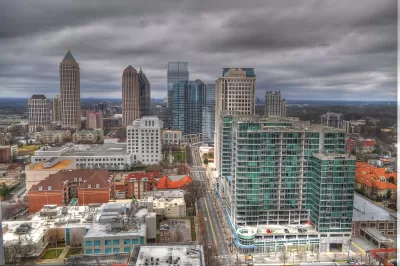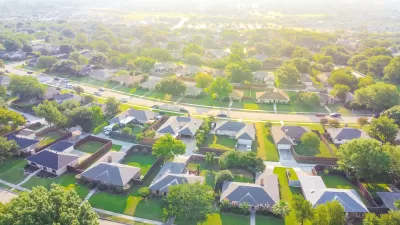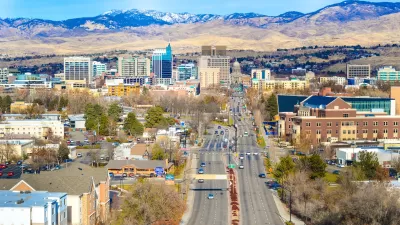The southern city’s growth is prompting questions about how to increase the housing supply, maintain affordability, and accommodate new residents.

The debate between those who want to preserve single-family zoning and housing advocates who say increases in density are necessary to make housing affordable is heating up in cities and non-urban areas around the country as the housing crisis spreads. As Sean Keenan reports in Atlanta Civic Circle, Atlanta is no different.
In metropolitan Atlanta, “NIMBY” groups concerned about ‘neighborhood character’ and the negative impacts of density increases are finding themselves in conflict with growth advocates who say increasing density is the only way to keep housing affordable for all income levels.
According to Abundant Housing Atlanta co-founder Alison Grady, “Atlanta is becoming more and more unaffordable, in large part due to the outdated zoning code that encourages suburban sprawl and huge homes on huge properties and discourages—or outright bans—more affordable options, such as tiny homes, duplexes, and small apartment and condo buildings.” Now, cities in the Atlanta metro are rewriting decades-old zoning codes to accommodate more growth and create more affordable housing for a growing population. “If Atlanta, Clarkston, and other metro-area cities truly want to make intown living attainable for lower-income residents—and ‘mitigate some of the negative social and environmental impacts of urban sprawl’—upzoning should be part of the equation,” says Sonia Hirt, a planning scholar from the University of Georgia. Atlanta itself is undergoing a revision of its zoning code, scheduled for completion in summer 2024, while other local cities are loosening regulations on ADUs and other ‘missing middle housing.’
FULL STORY: As metro Atlanta cities rewrite zoning laws, will they follow national trend of embracing density?

Alabama: Trump Terminates Settlements for Black Communities Harmed By Raw Sewage
Trump deemed the landmark civil rights agreement “illegal DEI and environmental justice policy.”

Planetizen Federal Action Tracker
A weekly monitor of how Trump’s orders and actions are impacting planners and planning in America.

The 120 Year Old Tiny Home Villages That Sheltered San Francisco’s Earthquake Refugees
More than a century ago, San Francisco mobilized to house thousands of residents displaced by the 1906 earthquake. Could their strategy offer a model for the present?

Ken Jennings Launches Transit Web Series
The Jeopardy champ wants you to ride public transit.

BLM To Rescind Public Lands Rule
The change will downgrade conservation, once again putting federal land at risk for mining and other extractive uses.

Indy Neighborhood Group Builds Temporary Multi-Use Path
Community members, aided in part by funding from the city, repurposed a vehicle lane to create a protected bike and pedestrian path for the summer season.
Urban Design for Planners 1: Software Tools
This six-course series explores essential urban design concepts using open source software and equips planners with the tools they need to participate fully in the urban design process.
Planning for Universal Design
Learn the tools for implementing Universal Design in planning regulations.
Clanton & Associates, Inc.
Jessamine County Fiscal Court
Institute for Housing and Urban Development Studies (IHS)
City of Grandview
Harvard GSD Executive Education
Toledo-Lucas County Plan Commissions
Salt Lake City
NYU Wagner Graduate School of Public Service





























